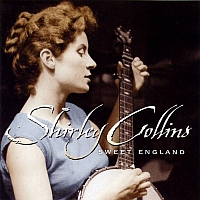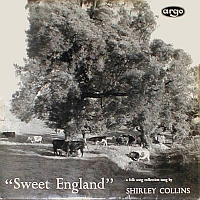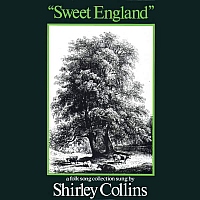Shirley Collins and Within Sound (3)
25. 4. 2011 | Rubriky: Articles,CD reviews
 [by Ken Hunt, London] This concluding section departs from the previous structure. In this coda Shirley Collins compares then and now. She recollects what it was like starting out for her, with the recording of her first two LPs Sweet England (1959) and False True Lovers (1960) back-to-back in 1958. With Alan Lomax and Peter Kennedy presiding, she cut the tracks for those two records over two days in a house in the north London residential district of Belsize Park. She reflects on what is happening now, especially her concerns about fast-tracked success and its disadvantages.
[by Ken Hunt, London] This concluding section departs from the previous structure. In this coda Shirley Collins compares then and now. She recollects what it was like starting out for her, with the recording of her first two LPs Sweet England (1959) and False True Lovers (1960) back-to-back in 1958. With Alan Lomax and Peter Kennedy presiding, she cut the tracks for those two records over two days in a house in the north London residential district of Belsize Park. She reflects on what is happening now, especially her concerns about fast-tracked success and its disadvantages.
 “I think it was quite spontaneous, a lot of it. Those two albums were recorded in two days. Everything was probably just done once, possibly twice if I made a great mistake. I just made up the next song as it came to it. At that time I was very naïve and I hadn’t been recorded like that before. In a way it was like a field recording, although done indoors in a studio. I was just singing the songs as they came up. Some of them had to be more thought about because other people were accompanying me on them. I don’t think we thought in advance because I know when all the recordings were made they were then divided up into the Folkways tracks and the Argo English choices. It wasn’t pre-planned. There was not that degree of sophistication or forethought then. It was quite spontaneous.
“I think it was quite spontaneous, a lot of it. Those two albums were recorded in two days. Everything was probably just done once, possibly twice if I made a great mistake. I just made up the next song as it came to it. At that time I was very naïve and I hadn’t been recorded like that before. In a way it was like a field recording, although done indoors in a studio. I was just singing the songs as they came up. Some of them had to be more thought about because other people were accompanying me on them. I don’t think we thought in advance because I know when all the recordings were made they were then divided up into the Folkways tracks and the Argo English choices. It wasn’t pre-planned. There was not that degree of sophistication or forethought then. It was quite spontaneous.
“None of us was used to recording anyway. We weren’t used to using microphones. I think you were always very nervous when you were being recorded as well. I remember feeling quite scared of the whole procedure.
“Nowadays you can record in your own kitchen or front room. Anyone can do it. I think anyone reading about how nervous one would be about doing it, would think, ‘Nah, it’s easy.’ It wasn’t then and I was recording for two rather important people. They were very encouraging. When I listen back to it, there really were some tracks on there that were quite lovely. And some that are quite dreadful; the songs aren’t worth being recorded. But it was typical of my repertoire at the time and typical of what I’d learned from home, so it was an honest record.”
 If you were soaking up a song then, assimilating it and making it something of your own, if you like, what sort of length of time would that process have taken for you in those days? The reason I ask is I get the feeling with a number of singers nowadays that they are too quick off the mark recording songs. They’re not under the skin of the song.
If you were soaking up a song then, assimilating it and making it something of your own, if you like, what sort of length of time would that process have taken for you in those days? The reason I ask is I get the feeling with a number of singers nowadays that they are too quick off the mark recording songs. They’re not under the skin of the song.
“To be fair, I think that’s pretty much me for my first two. I wasn’t ready. They were too early. The songs weren’t good enough really. A great many of them were trivial and when I look back at them now I do cringe. But I think the difference between me then is that we didn’t have all the information behind us that the singers today should have. If they express an interest in traditional song, they should be prepared to listen to the traditional singers.
“I think you’re right. I think a lot of them are recording too soon. It’s understandable because if you want to make a career of singing you want to get going fairly quickly. Because they receive so much praise for their recording – they’re either the Best New Album of the Year or the Best Songwriter, Best Song or Best Folksinger – they’ve got to come up with the Best every year. You got so many Bests out there that it’s difficult to pick out the Best now. Not enough of them are listening to enough of the traditional singers that they should be listening to. You’ve got to listen to your Harry Coxs, your Phoebe Smiths, your Caroline Hughes, your Harry Uptons and your Coppers; you’ve just got to. How can you be a singer of traditional song if you haven’t formed any basis in the real thing and you’re acquiring songs the easy way from what the Revival singers were singing? And some of the Revival singers weren’t picking up from proper sources either, you know, from the best of the singers.
“So, in some cases the new singers are picking up ‘double-poor’: they’re not learning from the best. They’re doing it the easy way. There’s not enough hard work in there. They can play instruments like mad. They’re very good instrumentalists. But they’re not listening to the songs: they’re listening to themselves singing the songs. It’s so apparent when you listen to: they want to sound like either Sandy Denny or Kate Rusby. Sandy wasn’t a traditional singer. Wonderful singer, wonderful songwriter and great in that genre but not in folk music. Half the girls are singing like children, like little girls whispering into the microphone. The music is more robust than that. Even though a lot of the songs are tender and romantic, there’s still a wonderful robustness about them. Melancholy yes, but there’s still strength in there too. That seems to be missing from a lot of the modern performances. It’s what I feel.”
For more information go to www.shirleycollins.co.uk
For information about the discographical output and song material of Shirley Collins, Martin Carthy, Anne Briggs, Nic Jones and their kind, set aside a couple of hours to browse Reinhard Zierke’s labour of love and folk disquisition. Begin with Shirley at: www.informatik.uni-hamburg.de/~zierke/shirley.collins/index.html
Small print
The copyright of all other images lies with the respective photographers, companies and image-makers. Unless otherwise stated, all interview material is original and copyright Ken Hunt.